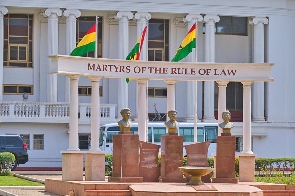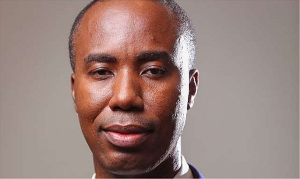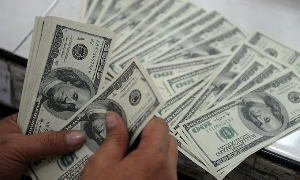Justice Barbara Ackah-Yensu, a Justice of the Supreme Court, has ordered that the guideline of the Food and Drugs Authority (FDA) banning celebrities from advertising alcoholic beverages be struck down because it is discriminatory.
For this reason, Justice Ackah-Yensu said that the directive stating "No well-known personality or professional shall be used in alcoholic beverage advertising" is “unconstitutional.”
Justice Ackah-Yensu, one of the two judges who dissented from the majority 5-2 decision upholding the FDA’s directive banning celebrities from endorsing alcoholic drinks, said the directive was “unconstitutional.”
In her dissenting opinion contained in a 75-page judgment delivered on June 19, 2024, and concurred by Justice Prof. Henrietta Mensa-Bonsu, but released on July 15, 2024, Justice Ackah-Yensu said the application of the FDA guidelines is “discriminatory.”
“In conclusion, I am convinced that the Plaintiff has made a compelling case that supports the conclusion that Guideline 3.2.10, which seeks to debar ‘well-known personalities and professionals’ from engaging in alcoholic beverages advertisement, is discriminatory and unconstitutional.
“I therefore declare Guideline 3.2.10 of the Guidelines for the Advertisement of Foods published by the 1st Defendant (FDA) on February 1, 2016, is discriminatory, inconsistent with, and in contravention of Articles 17(1) and (2) of the 1992 Constitution, and thus unconstitutional.
“Accordingly, I hereby order the striking down of Guideline 3.2.10 of the said Guidelines as being inconsistent with and in contravention of the letter and spirit of the 1992 Constitution.
“Finally, the Defendants, their agents, servants, or assigns are perpetually restrained from acting under the said Guideline 3.2.10,” Justice Barbara Ackah-Yensu stated.
Conclusion
In summation of Justice Ackah-Yensu’s opinion, she said, “I do agree with the Plaintiff that these advertisements are pursued by some of these persons for economic living. It is therefore an unconstitutional attempt to cut their economic livelihoods merely because they are able to arouse the interest of society.
“I do not arrive at these conclusions oblivious of this Court being a policy court, and indeed empowered to direct the policy of the State,” she stated to buttress her point.
“I must state without equivocation that I subscribe fully to the discourse against the infiltration of our society, and especially motivating our young ones and minors to engage in alcohol and drug abuse.
“My subscription notwithstanding, I am guided by the constitutional tenets, its letter, and spirit.
“As admonished by the Court in the famous Tufour v Attorney-General (1980) GLR 637, every conduct must conform to the due process of law.
“The 1st Defendant must design a mechanism that is consistent with the Constitution to attain the mischief it seeks to cure with the publication of these guidelines, especially Guideline 3.2.10.
“Presently, however, in my view, Guideline 3.2.10 is inconsistent with and in contravention of Articles 17(1) and (2) of the 1992 Constitution. As aforesaid, there are already in place restrictions provided by the Liquor License Act and Guidelines 3.2.1 to 3.2.9 to ensure the responsible use of alcohol for public safety and health.
“And if Parliament finds it necessary to exclude any specific and defined group from advertising alcoholic beverages, it may so legislate.
“But for now, the blanket prohibition of persons who are said to be ‘well-known within society’ to advertise alcoholic beverages is discriminatory, arbitrary, and in contravention of the 1992 Constitution and same ought to be declared a nullity.
“In conclusion, I am convinced that the Plaintiff has made a compelling case that supports the conclusion that Guideline 3.2.10, which seeks to debar ‘well-known personalities and professionals’ from engaging in alcoholic beverages advertisement, is discriminatory and unconstitutional.
“I therefore declare Guideline 3.2.10 of the Guidelines for the Advertisement of Foods published by the 1st Defendant on February 1, 2016, is discriminatory, inconsistent with, and in contravention of Articles 17(1) and (2) of the 1992 Constitution, and thus unconstitutional.
“Accordingly, I hereby order the striking down of Guideline 3.2.10 of the said Guidelines as being inconsistent with and in contravention of the letter and spirit of the 1992 Constitution.
“Finally, the Defendants, their agents, servants, or assigns are perpetually restrained from acting under the said Guideline 3.2.10.”
On June 19, 2024, the Supreme Court, in a 5-2 majority decision, upheld the FDA’s directive banning celebrities from endorsing alcoholic drinks.
The seven-member panel, presided over by Chief Justice Gertrude Sackey Torkornoo, held that the FDA guideline was not unreasonably excessive and was not in contravention of the 1992 Constitution.
“We find from the above that the Defendant has authority under the Public Health Act, 2012, Act 851, to issue guidelines in connection with food and drugs, including alcoholic beverages in order to regulate the production and consumption of these items with the aim of protecting and promoting the general well-being and health of all persons in Ghana.
“We find that guideline 3.2.10 was issued by the 15 Defendant within the general
powers conferred on the 1st Defendant by the Public Health Act, 2012, Act 851.
“We hold that guideline 3.2.10 is not unreasonable or excessive and that it is in the interest of the public health of Ghana. Consequently, guideline 3.2.10 is not discriminatory and it is neither inconsistent with nor contravenes articles 17(1) and (2) of the 1992 Constitution.
“The Plaintiff’s action therefore fails in its entirety and it is therefore dismissed,” the Majority stated.
The majority judges are – Chief Justice, Gertrude Sackey Torkornoo, Justice Paul Baffoe-Bonnie, Justice Mariama Owusu and Justice George Kingsley Koomson.
In 2015, the FDA issued a directive banning celebrities from endorsing alcoholic beverages.
It held that the ban was to protect minors as well ensure public health safety.
Unhappy with the directive, Mark Darlington Osae, an artiste manager, proceeded to the apex court to challenge the FDA’s directives saying it was a violation of equality and discriminatory against the creative industry.
General News of Saturday, 20 July 2024
Source: kasapafmonline.com













